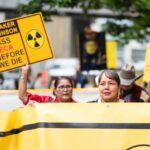The future of GNEP: Next steps
By Leonor Tomero | August 18, 2008
With the global expansion of nuclear energy and the weakening of international rules governing nuclear trade, there’s a risk that sensitive fuel-cycle knowledge may spread, allowing more countries to acquire the capabilities to build nuclear weapons. The Bush administration claims that its Global Nuclear Energy Partnership (GNEP) will minimize this risk. Unfortunately, in reality, GNEP has encouraged the spread of the know-how that ultimately could allow many more countries to possess nuclear weapons.
With the global expansion of nuclear energy and the weakening of international rules governing nuclear trade, there's a risk that sensitive fuel-cycle knowledge may spread, allowing more countries to acquire the capabilities to build nuclear weapons. The Bush administration claims that its Global Nuclear Energy Partnership (GNEP) will minimize this risk. Unfortunately, in reality, GNEP has encouraged the spread of the know-how that ultimately could allow many more countries to possess nuclear weapons.
Following are several recommendations to ensure that the global expansion of nuclear energy doesn't translate into a spread of nuclear weapons:
- Washington should abandon its plan to resume domestic commercial reprocessing (outlined in both GNEP and the Advanced Fuel Cycle Initiative, GNEP's research and development program). It should make clear that it will not reprocess–which had been the U.S. practice for 30 years until GNEP's inception in 2006. This decision wouldn't likely generate opposition from the nuclear industry because reprocessing exacerbates both the costs of nuclear energy and proliferation risks.
- Similarly, it's essential to lower the prestige associated with research and development related to reprocessing and reusing plutonium in fast neutron reactors. The United States should emphasize the high costs and resulting toxic and radioactive waste streams associated with reprocessing, as well as the high costs, safety problems, and failure of nearly all past efforts to develop commercially viable fast reactors. Evidence is easy to find; the United States, France, Japan, Britain, and Germany all shut down fast reactors after years of safety problems and cost overruns. Washington should also make clear that it opposes any plans for either national or international reprocessing since reprocessing isn't a necessary part of the fuel cycle.
- To lead by example, the United States should place its domestic enrichment facilities under multilateral control. This vision to control sensitive nuclear technology–first proposed 50 years ago in the Acheson-Lilienthal Report–is just as relevant today as it was then. Such a proposal might still seem unrealistic since domestic uranium enrichment facilities are perceived as prestigious and as guarantors of energy security and independence, but new conditions and the risk of sensitive nuclear knowledge spreading require giving this approach serious consideration. In addition to lessening the national prestige associated with sensitive nuclear technology, multilateral facilities lessen the risk of a country diverting the material produced there and fashioning it into a nuclear weapon.
- Washington should demand that its allies abandon ongoing plans or forego ambitions to develop these technologies. This policy would entail the United States not encouraging or cooperating with non-nuclear weapon states on research and development of sensitive nuclear technologies, unlike the Bush administration's current support of South Korea's program. Such policies worked in the past. For example, during the Carter administration, the United States expressed concern to Taiwan's prime minister over his country's plan to acquire a reprocessing facility from French and Belgian companies. As a result, the Taiwanese government made public statements that it wouldn't pursue nuclear weapons or reprocessing technology. In this context, Washington should no longer make exceptions for friends such as Canada, India, and Brazil. Double standards prevent efforts to limit the spread of dual-use technologies and complicate ongoing diplomacy to resolve confrontations over nuclear programs in countries such as Iran.
- The new administration should reiterate that the United States won't sign nuclear cooperation agreements with counties that haven't signed the International Atomic Energy Agency's (IAEA) Additional Protocol and encourage other countries (and the IAEA and Nuclear Suppliers Group) to do the same. President George W. Bush proposed such a condition in a 2004 speech at the National Defense University: "Only states that have signed the Additional Protocol [should] be allowed to import equipment for their civilian nuclear programs." But his administration failed to uphold this policy; the United States is negotiating nuclear energy deals with countries that haven't agreed to tougher inspections and monitoring such as the United Arab Emirates and Saudi Arabia.
- Rather than focusing on expanding nuclear energy, Washington should prioritize renewable energy cooperation, along with grid and infrastructure modernization and expansion–especially in volatile regions such as the Middle East and South Asia. An often-ignored provision of the Nuclear Non-Proliferation Act already obligates the United States to cooperate with developing countries to assess and develop renewable energy resources.
- At home, the new administration should redirect funding currently provided to the national labs for reprocessing and fast neutron reactor research to programs that improve and reduce the cost of safeguards technology, explore ways to make uranium enrichment more proliferation-resistant, and develop renewable energy.
- Finally, if the United States expects non-nuclear weapon states to forego enrichment and reprocessing and accept additional obligations such as more intrusive inspections, continued progress on nuclear disarmament must be achieved. Leading nonaligned states such as Egypt have warned that they won't accept additional obligations if the nuclear weapon states don't make further progress toward fulfilling their Nuclear Non-Proliferation Treaty obligations to disarm. To create an atmosphere of trust, Washington should further reduce its nuclear arsenal, extend legally binding verification provisions related to reductions of nuclear weapons, ratify the Comprehensive Test Ban Treaty, and negotiate and implement a Fissile Material Cut-Off Treaty.
Policies outlined and implemented by the next administration related to nuclear energy–and particularly sensitive nuclear technologies–will significantly shape whether and how nuclear energy will spread globally and whether many more countries will become nuclear weapons-capable. A concerted policy, rather than allowing ad hoc developments to shape a new and potentially dangerous future, will be essential if the world is to maintain control over technologies that can be used to make nuclear weapons.
Together, we make the world safer.
The Bulletin elevates expert voices above the noise. But as an independent nonprofit organization, our operations depend on the support of readers like you. Help us continue to deliver quality journalism that holds leaders accountable. Your support of our work at any level is important. In return, we promise our coverage will be understandable, influential, vigilant, solution-oriented, and fair-minded. Together we can make a difference.
Topics: Nuclear Energy















